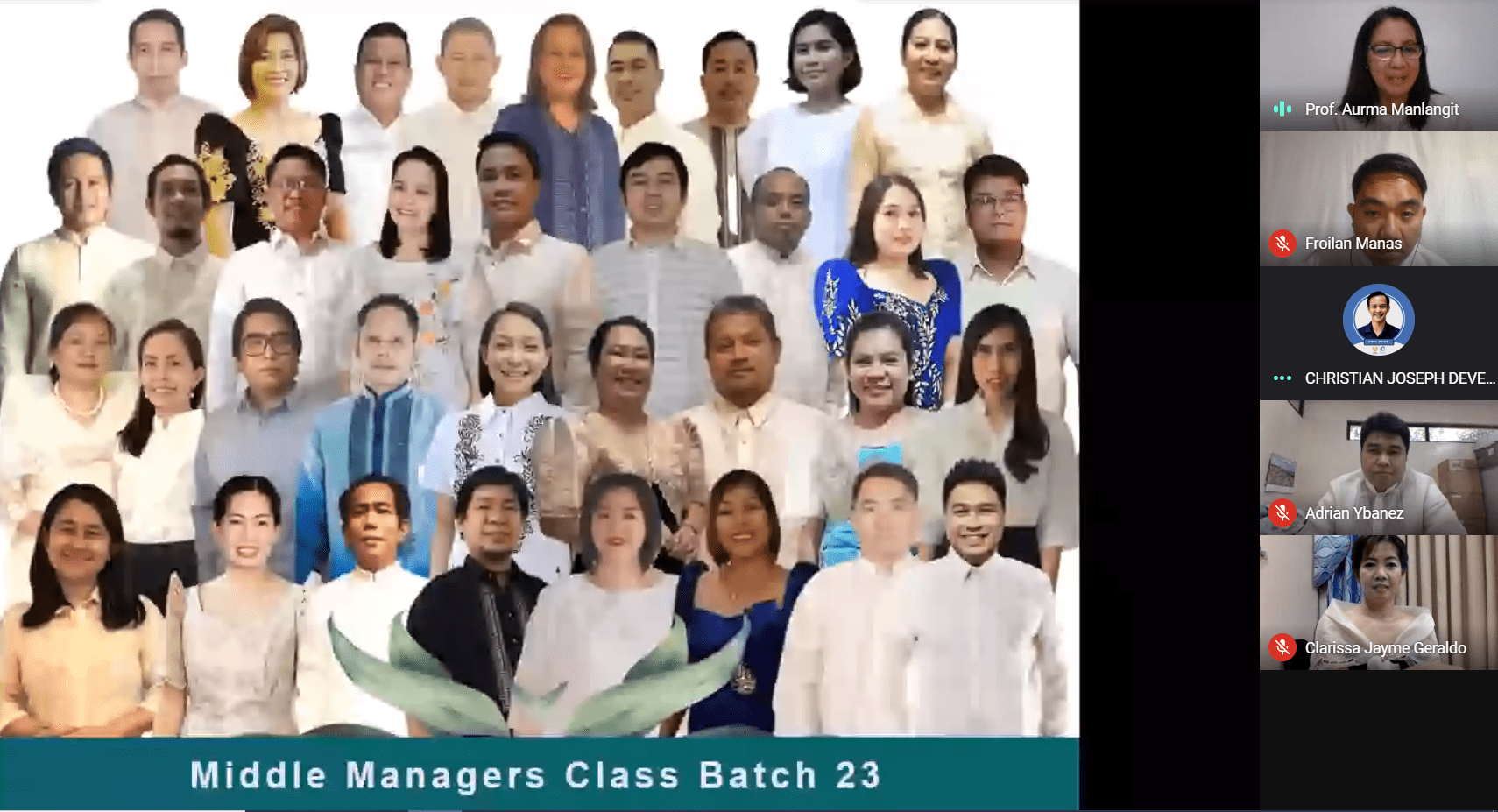
June 1, 2020 – PMDP’s first class to undergo flexible learning officially started today, marking another milestone for the Program in the year 2020. The Opening Ceremony, though conducted virtually, maximized alternatives to the traditions observed in the past via Google Meet.
Although most universities and learning institutions still view education as an activity that is most efficiently delivered face-to-face, mass gatherings at this time continue to be prohibited. In fact, PMDP’s Sensing Journey and Foreign Study Mission that previously required physically immersing in local and international communities, respectively, have to be re-imagined in a way that caters to the current situation without compromising the learning objectives. Using available digital collaborative platforms, the PMDP community laboriously re-worked the Program to be able to conduct classes for its scholars from various agencies across the country. Though discussions on adopting virtual learning have circulated in the past with much reservation especially among the higher management, the current public health situation has inadvertently provided the impetus for this transition. While internet connectivity still remains the biggest challenge, PMDP remains hopeful and ready to troubleshoot as the need arises.
A welcome to a long-standing legacy and inherent responsibility
DAP President & CEO, Atty. Engelbert C. Caronan, Jr. opened the doors of DAP to MMC 23 with a few reminders on the aspirations behind their admission to the Program, especially in view of our current situation. He expressed his joy on the growing number of scholars that PMDP has admitted through the years. He said the MMC23 scholars are “now officially part of a very long tradition and a unique system designed specifically to enhance the way we deliver public service”.
As president, he stressed how the continuous run of the Program despite the odds, proves its indispensability to this administration. He shared that PMDP is most essential now more than ever as the “government is challenged to perform and deliver under the most stressful and challenging environment,” and this inference can be observed just by looking around.
Caronan proceeded to share three points that he believes are necessary to tackle the pressures of quickly addressing urgent issues — delivering solutions and recovering from difficulties as agents of the national government, namely: 1) Realization, internalization and acceptance of the characterization of the environment as volatile, uncertain, complex and ambiguous; 2) Understanding that the only way to survive this kind of environment is to be innovative and agile; and, 3) Willingness to change.
With these enumerated, he hoped that the scholars’ training under the Program will equip them with sufficient knowledge in the areas he mentioned as essential because “being in the government, creating social value or doing social innovation is an imperative.”
The start to a journey of many


After being welcomed by the DAP President, the batch was introduced to the people who will be providing them support throughout their PMDP journey. Senior Vice President for Programs Magdalena L. Mendoza introduced the esteemed pool of faculty, comprising of accomplished mentors from different fields of specialization, while Managing Director Nanette C. Caparros introduced the members of the program management team. This round of introductions culminated with Class Director Aurma A. Manlangit presenting the officially admitted scholars of Middle Managers Class Batch 23 to the body.

Challenged to be “tidal waves of change”
It is traditional for a representative from the previous batch to toss a challenge of excellence to the scholars of the new class. This was extended by the MMC Batch 22 – Uhay’s president, Mr. Romel E. Tanghal of the National Economic Development Authority’s Regional Office XII. Tanghal advised the new scholars who will be “molded to be the tidal waves of change in our bureaucracy” to always keep in mind what public service and love of the country truly means.
The PMDP modules will not only change them academically but also characteristically. It will also make them realize that “there is so much to unlearn, re-learn and learn” in the next five months, Tanghal mused. He also stressed the importance of building strong bonds with their co-scholars. Lastly, Mr. Tanghal formally posed his challenge to the batch if they are ready to transform themselves to be “the future agents of change” in both the government and the country.

A resounding “YES” to being the public servants the Filipino people need

It is also customary for a representative for the incoming batch to respond to the “Challenge for Excellence”. Represented by Mr. Ricardo Benjamin Osorio of the Public-Private Partnership Center, MMC 23 expressed gratitude for the former batch’s advice on what to expect, as well as how to face the difficulties that might come their way. Osorio acknowledged the extraordinary circumstances the previous batch was faced with as well as the unique set-up the incoming batch will be pioneering.
From the untimely eruption of the Taal Volcano to the pandemic that is affecting not only the country but the whole world, such times will surely send fear and uncertainty to people, Osorio lamented. It is “truly jarring, deeply concerning, and oftentimes maddening”.
He expressed, however, that this challenging period should not be viewed as a series of unpleasant events but “a perfect backdrop to mold public servants that are objective but compassionate, dynamic, principled, and determined”. While the Philippine government is currently facing several issues as the result of the pandemic, he views this as an opportunity to inspire “spirited discussion, debate, and consensus building towards the development of workable plans”.
With this, the scholars of MMC 23 formally accepted the challenge posed to them with a resounding yes, aiming to be the public servants that the Filipino people need the most during these trying times.



